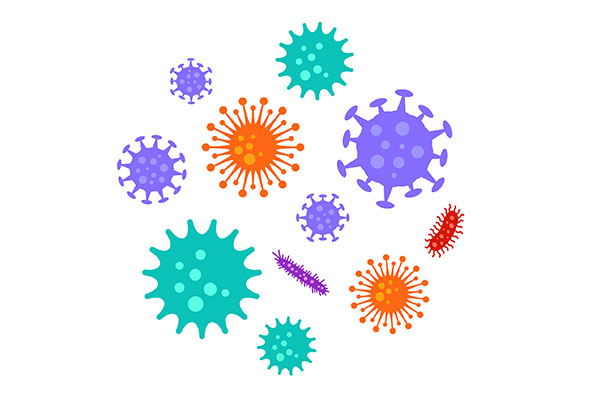Urgent Care 101: What’s the Difference Between a Viral and Bacterial Infection?

Urgent care facilities often treat patients with common viral and bacterial infections. Because of our wealth of experience with illnesses caused by infection, our urgent care in Fairfax gives fast, accurate diagnosis and treatment.
Viral and bacterial infections have been around for as long as life has existed. They can take the form of irritations, like the common cold or a nasty stomach bug. On the other end of the spectrum, pandemics like cholera, the black plague and the Spanish flu have made their marks on our history and even our art.
Which is why it is only fitting that we should learn the basics about infections. We can start by learning the difference between bacterial and viral infections.
Understanding infections
Bacterial infections
The best place to start is by knowing what bacteria are. Bacteria are single-celled organisms that come in different shapes; the same way different plants and animals have different forms.
Some bacteria look like tiny rods, some look like spirals and others look like balls. Much of the bacteria around and in us are either helpful or neutral.
There are also different kinds of bacteria that cause disease. Some bacteria only cause minor illnesses while others can be deadly if left untreated. Once disease-causing bacteria enter the body and make themselves at home, they produce toxic waste products that make a person ill.
Common bacterial infections are streptococcus, which causes strep throat, and E. coli, which can be life-threatening.
Viral infections
As far as micro-organisms go, a virus is a miniscule thing. It is many, many times smaller than a bacterium. Also, unlike bacteria, viruses do not have conventional cell structures, like a cell wall, a power source or a nucleus that contains DNA and/or RNA.
Instead, a virus has a string of genetic material enclosed in a protein-coated sheath. Because they resemble the undead, viruses need living cells to survive. Once they enter the body, they co-opt the cells of the host in order to make copies of themselves.
The viruses eventually kill or damage the hijacked cells, which makes a person sick. Common illnesses caused by viruses are:
- Colds
- Flu
- Sinus infections
- Chickenpox
- Human Papillomavirus, which causes cervical cancer
- Chest colds
- HIV, a chronic infection whose cure is still in the testing phase
Because viruses lack a cell structure, the immune system struggles to pin them down. Antibodies defend the body by binding to a foreign body. When the foreign bodies are bacteria, antibodies can easily bind to their cell walls.
Not so with viruses. They have no cell walls, which makes them like Teflon in a way. This lack of a conventional cell structure makes viruses hard to neutralize.
Diagnosing infections
When the body detects an infection, the immune system kicks into gear and tries to fight back. As a result, a person will experience fever and, most times, swollen lymph nodes.
Depending on the illness, other symptoms will pop up, but even those secondary symptoms will not give a definite identification of the culprit. For example, meningitis, pneumonia and a running stomach can be caused by both bacteria and viruses.
The only way to know for sure is to get thoroughly tested by medical professionals.
Treating infections
Once a doctor knows the cause of the infection, they will treat it. Bacterial infections are treated with antibiotics.
Viral infections are harder to treat, though. In most cases, a doctor will treat the symptoms so that the body does not get overwhelmed with problems like high temperature, blood pressure or dehydration. They will then wait out the virus while helping the body remain in the best condition, given the circumstances.
There has been some progress made with some viral diseases. The result is the creation of a few types of antiviral medication.
Visit an urgent care center for infections
Many infections start with a high temperature and some fatigue. It could be a flu, a chest cold or it could be something more serious. Though it is brave of you to try and power through what you think is an annoying bug, it is a much better idea to get the infection checked out.
Come by our urgent center near Fairfax for quick service and a fast diagnosis. The treatment you get from us will get you back on your feet in a short time.
Stop by today…
Request an appointment here: https://millenniummedicalcare.com or call Millennium Medical Care at (703) 372-4429 for an appointment in our Fairfax office.
Check out what others are saying about our services on Yelp: Read our Yelp reviews.
Recent Posts
Liver testing helps identify liver inflammation, injury, or reduced liver function before serious complications develop. Both urgent and primary care providers use these blood tests to investigate symptoms, evaluate abnormal findings, and monitor known liver disease or medication effects. Liver testing often includes liver enzymes and proteins that reflect liver-cell injury and the liver's ability…
If you recently had the common cold, you are hardly alone. This is likely the most frequent illness that medical professionals treat and that people deal with. The symptoms can range from minor to severe and everywhere in between. You may recover fully within a couple of days, or the cold may hang on for…
Having a common cold is more than just having the sniffles. It can weaken you and make you miserable. The upside to this is that it is self-limiting. But you will be contagious during its onslaught. If you want to know more about the common cold and how a viral infection happens, here are the…
Contracting the common cold involves suffering from sore throat, sneezing, nose, and cough. It is a disease affecting many communities. Colds may be common, but these infections are enough to make you miss work or classes. The most effective way to fight colds is to prevent them. Going to your local urgent care facility can…


